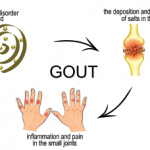“The take-home message is that the risk factors that they examined are modifiable—some of them are easier to modify than others, so individuals can decide what they think they are able to do,” Dr. Melamed says by email.
“Some can start with eating less red meat or drinking less alcohol,” Dr. Melamed says. “If patients are on a diuretic, they can discuss the risk of high uric acid levels with their physician and see if a different blood pressure medication may be better for them.”
ad goes here:advert-1
ADVERTISEMENT
SCROLL TO CONTINUE
Reference
- Choi HK, McCormick N, Lu N, et al. Population impact attributable to modifiable risk factors for hyperuricemia. Arthritis Rheumatol. 2019 Sep 4. [Epub ahead of print]

